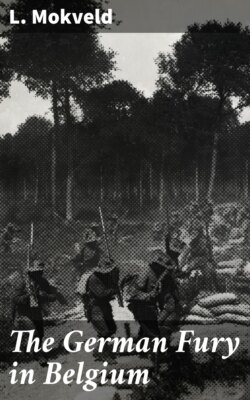Читать книгу The German Fury in Belgium - L. Mokveld - Страница 3
На сайте Литреса книга снята с продажи.
PREFACE
ОглавлениеTable of Contents
Among the many books published on the behaviour of the German Army in Belgium, this account by a distinguished Dutch journalist must occupy a unique place. It is written by a neutral, who held, at the start, no brief for either side. It is written by an eye-witness, who chronicles not what he heard, but what he saw. It is written also by one who mingled with the German troops and was present at the inception of the whole campaign of outrage. Mr. Mokveld took his life in his hands when, with great courage and devotion, he visited Visé and Liège and Louvain at the most critical moments. His character of neutral journalist was only a flimsy protection among the drunken and excited German troops. But his boldness was justified, for after many adventures he came safely through, and he was enabled in those early weeks to see the whole of Belgium from Liège to the Yser and from Antwerp to Dinant. The result is an admirable piece of war-correspondence, which bears on every page the proofs of shrewd observation and a sincere love of truth and honest dealing.
There is much in Mr. Mokveld's narrative to interest the historian. For example, he gives a fuller account than we have yet had of that obscure period when Liège had fallen, but its northern forts were still holding out. But it is less a history of the campaign than a chronicle of those lesser incidents of war which reveal the character of the combatants. No more crushing indictment of German methods has been issued, the more crushing since it is so fair and reasonable. The author has very readily set down on the credit side any act of German humanity or courtesy which he witnessed or heard of. But the credit side is meagre and the black list of crimes portentous. Episodes like the burning of Visé and the treatment of British prisoners in the train at Landen would be hard to match in history for squalid horror.
Two facts are made clear by Mr. Mokveld's book, if, indeed, the world has ever doubted them. The first is that the German authorities, believing their victory to be beyond question, deliberately sanctioned a campaign of frightfulness. They did not imagine that they would ever be held to account. They wished to terrorise their opponents by showing them what resistance involved. The atrocities were not the blunders of drink-sodden reservists, but the result of the theories of half-witted military pedants. The second is that the invading armies were as nervous as a hysterical woman. Those would-be conquerors of the world were frightened by their own shadows. A shot fired by accident from a German rifle led to tales of attacks by Belgian francs-tireurs and then to indiscriminate murder by way of revenge. Mr. Mokveld examined the legends of treacherous Belgian assaults and the mutilation of the German wounded, and found them in every case wholly baseless. No German had ever seen these things happen, but had only heard of them. When definite details were given, Mr. Mokveld tracked them down and found them false. The Belgian atrocities lacked even that slender justification which belongs to reprisals. They were the work of a drunken and "rattled" soldiery—for fear is apt to make men brutal—deliberately encouraged by the authorities, who for this purpose relaxed the bonds of military discipline. When the battle of the Marne changed the complexion of affairs, these authorities grew scared and repudiated the policy, but Belgium remains a witness of what Germany's triumph means for her victims.
John Buchan.
